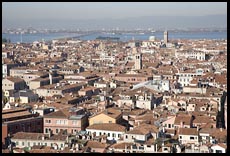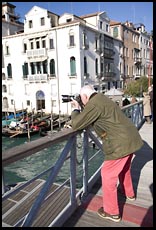
Seasons in Venice
by Philip Greenspun; created January 1995
"In the afternoon Aschenbach spent two hours in his room [on the Lido], then took the vaporetto to Venice, across the foul-smelling lagoon. He got out at San Marco, had his tea in the Piazza, and then, as his custom was, took a walk through the streets. ...
"There was a hateful sultriness in the narrow streets. The air was so heavy that all the manifold smells wafted out of houses, shops, and cookshops--smells of oil, perfumery, and so forth--hung low, like exhalations, not dissipating. Cigarette smoke seemed to stand in the air, it drifted so slowly away. ... Beggars waylaid him; the canals sickened him with their evil exhalations. He reached a quiet square, one of those that exist at the city's heart, forsaken of God and man; there he rested awhile on the margin of a fountain, wiped his brow, and admitted to himself that he must be gone."
-- Thomas Mann (1875-1955), Death in Venice (1912)
Remember that European countries have school holidays in July and August, which is also when companies shut down. Venice is accordingly fully stuffed during those months.

Venice fills up in early September with the Venice Film Festival, mostly out on the Lido. On November 21, the city's deliverance from the plague is celebrated in the Festa della Salute. A bridge of boats is strung across the Grand Canal; people walk across it and into the church of Santa maria della Salute.
"I never got a cold when I worked in St. Moritz, the air is so dry. Every winter that I stay in Venice with the damp air, I'm sick for two months," noted Bianco, a butler at the Hotel Cipriani's Palazzo Vendramin. I arrived in Venice in January with a slight cold. Water fell on me from the sky and rose up from the sea to cover my shoes. Then it started to snow. After a few days of this, I was giving demonstrations of my maladies in Venetian pharmacies. I ended up taking four different Italian drugs that I couldn't pronounce, much less read the lengthy instructions. I sent email to my friends telling them that "I either have AIDS or am Jewish." The hotel staff brought me extra boxes of Kleenex. People avoided sitting next to me on the vaporetti.
"If you seek solitude and romance with a capital R, go in January," notes the Cadogan guide. The authors' idea of romance probably includes scaffolding on the monuments, "closed until February" signs on museums, gelaterie, and restaurants, and seeing half the town holding handkerchiefs to their noses. The upside of all this is that the city does in fact empty out enough that you can be alone at St. Mark's tomb, get a table in any restaurant, and never wait in line. [Carnival, of course, gets rather crowded, but that is only ten days until Shrove Tuesday (i.e., February).]
If you wander in winter outside of the usual tourist centers, you quickly understand why Venetians mourn for their city. The campos are deserted. The average age of a pedestrian is between 70 and dead. You can feel the population draining out, the loss of civic life and community.
On the Sunday after Ascension Day (May), Venice celebrates its annual Marriage with the Sea. This has been going on since the year 1000. There are a whole bunch of miscellaneous regattas in May as well.